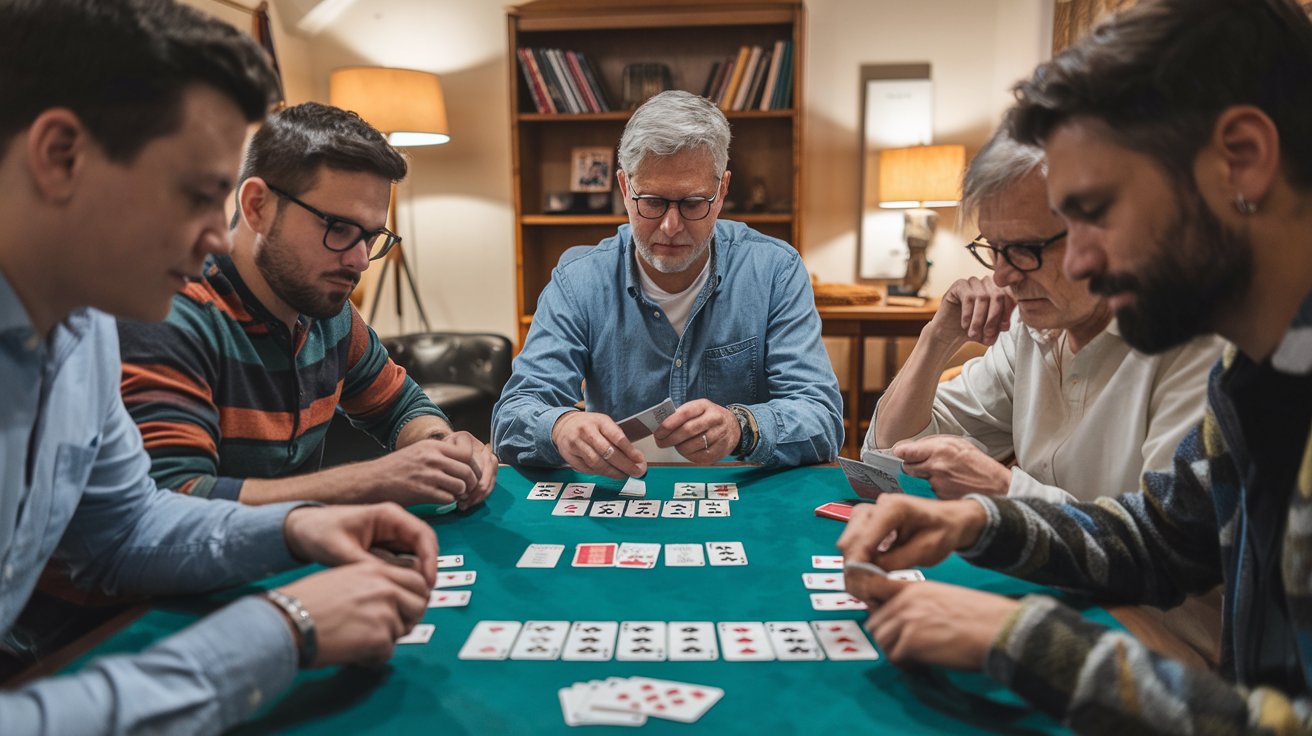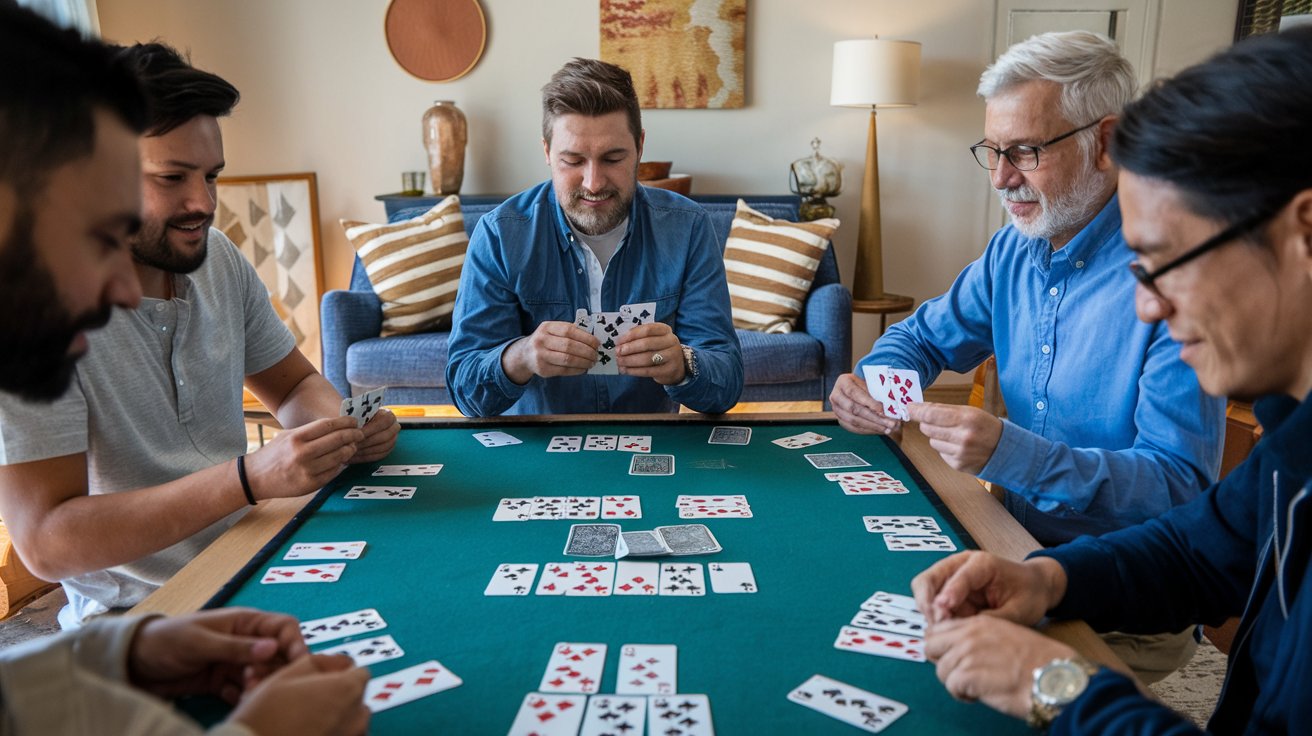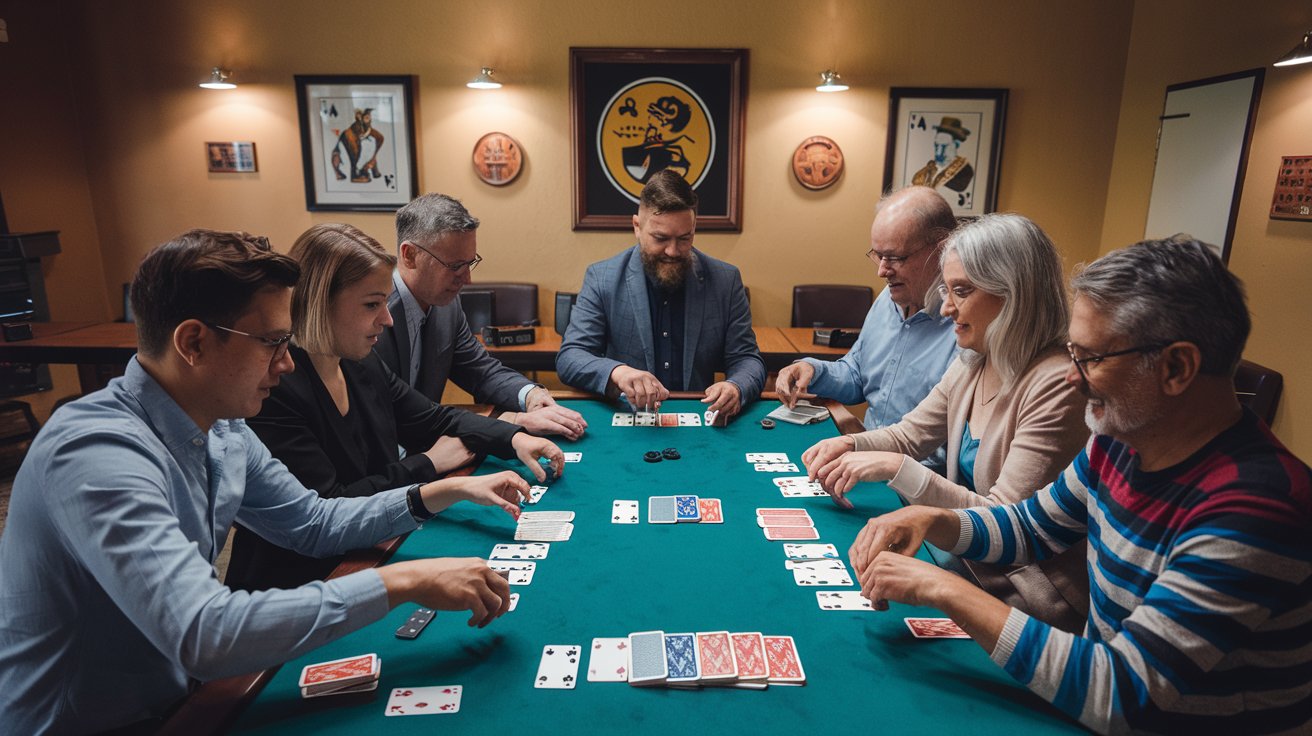Team play in Rummy transforms a familiar card game into an exhilarating test of strategy, coordination, and mutual trust. Whether you’re playing in friendly gatherings, local tournaments, or online team events, mastering team-based strategies can give you a significant edge over your opponents. In this in-depth guide, we’ll explore the best Rummy strategies for team play—covering everything from pre-game planning and communication techniques to real-time tactics and post-game analysis. By integrating these strategies into your team’s playbook, you can elevate your game and enjoy a more collaborative, dynamic approach to Rummy.
Introduction: Why Team Play in Rummy is a Game Changer

Rummy is traditionally seen as a solo battle of wits, where each player competes to form melds and sequences from a mixed deck of cards. However, team play brings an entirely new dimension to the game. It allows you to pool your collective skills, share insights, and strategically outmaneuver your opponents. The best teams know that communication, trust, and coordinated tactics can turn the tide of any match. In team Rummy, every card, every discard, and every subtle hint shared between teammates can be the catalyst for a winning strategy.
SEO Keywords: best rummy strategies for team play, team Rummy tactics, winning team strategies in Rummy, collaborative Rummy play
Understanding Team Play in Rummy

Before diving into advanced strategies, it’s important to understand the basics of Rummy and what makes team play unique.
The Basics of Rummy
At its core, Rummy is about forming valid melds—either sets (cards of the same rank) or sequences (cards in consecutive order of the same suit). The primary objective is to reduce your hand’s deadwood and, ultimately, to declare by melding all your cards. The game involves drawing, discarding, and strategically planning your moves while keeping an eye on your opponents.
How Team Play Differs from Solo Play
In team Rummy, the stakes are higher and the dynamics are more complex. Instead of solely focusing on your own hand, you’re also aware of your teammate’s strengths, weaknesses, and strategies. The collaborative nature of team play introduces several unique factors:
-
Cooperative Decision-Making: Teammates can share insights and make joint decisions that can improve overall team performance.
-
Enhanced Strategy: By pooling collective knowledge, teams can adopt advanced tactics that may be difficult to execute alone.
-
Mutual Support: In team play, covering for each other and balancing offensive and defensive strategies become key to success.
-
Shared Risk and Reward: Each decision impacts not just one player, but the entire team, leading to more nuanced, collective strategies.
SEO Keywords: team Rummy play, collaborative Rummy strategies, advantages of team Rummy, group card game strategies
Pre-Game Preparation: Building a Winning Team Strategy

Successful team play in Rummy begins long before the first card is dealt. Pre-game preparation is essential to set the foundation for in-game success.
Selecting the Right Teammates
A strong team starts with the right players. Consider these factors when forming a team:
-
Skill Level: While diversity in skill can sometimes be beneficial, it’s generally best to team up with players who have a similar understanding of Rummy.
-
Communication Style: Effective communication is key. Look for teammates who can articulate their thoughts clearly and listen to feedback.
-
Complementary Strengths: Every player has unique strengths. One might be excellent at spotting melds quickly, while another excels in defensive discarding. Combining these strengths can create a formidable team.
-
Mutual Trust: Trust is the cornerstone of any successful team. Ensure that every member is committed to the collective goal and is willing to work together under pressure.
SEO Keywords: choosing Rummy teammates, team selection in Rummy, complementary skills in team Rummy, effective team building for Rummy
Establishing Clear Communication Channels
Effective communication is essential to synchronize your team’s efforts. Prior to playing, agree on a system for relaying information during the game:
-
Verbal Cues: Develop discreet signals or phrases that can indicate whether a card is beneficial or risky. These can help teammates understand your hand without giving away too much to the opponents.
-
Non-Verbal Signals: Body language and subtle gestures can also be used to communicate. For example, a quick nod or a hand gesture might signal readiness to switch from offense to defense.
-
Pre-Game Discussions: Spend some time discussing potential scenarios and agreeing on a common game plan. This alignment helps your team remain coordinated even in fast-paced situations.
SEO Keywords: communication in team Rummy, effective team signals, team coordination in card games, Rummy communication strategies
Developing a Pre-Game Plan
A well-thought-out pre-game plan can significantly improve your team’s performance:
-
Assign Roles: Decide which team member will take the lead in different aspects of the game. One person might focus on offense while another monitors defensive plays.
-
Strategic Priorities: Outline your team’s overarching strategy. For example, you might decide to adopt an aggressive approach if the opportunity arises or a conservative strategy if the opponents seem particularly strong.
-
Contingency Plans: Prepare for unexpected scenarios by discussing backup strategies. Having a contingency plan ensures that your team can quickly adapt if the game takes an unforeseen turn.
SEO Keywords: pre-game planning for Rummy teams, team strategy development, contingency planning in Rummy, role assignment in team Rummy
Key Team Strategies for Rummy
Now that your team is set up for success, it’s time to delve into the core strategies that can give you a competitive edge during play.
Coordinated Card Management
Efficient card management is critical in team Rummy. Coordinated efforts between teammates can help in:
-
Tracking Discards and Draws: By sharing observations on the cards that have been played, your team can maintain an accurate mental map of the remaining cards.
-
Optimizing Melds: Work together to ensure that each team member’s hand complements the overall strategy. If one player is close to forming a crucial meld, teammates can avoid discarding cards that might complete it.
-
Balancing Individual and Team Goals: While each player focuses on their own hand, always keep the bigger picture in mind. The goal is to create melds that not only benefit one player but also strengthen the team’s position collectively.
SEO Keywords: coordinated card management, team meld optimization, tracking discards in Rummy, team card strategy
Sharing Information and Reading the Table
Team play allows for a broader view of the game, as multiple perspectives can reveal hidden opportunities:
-
Pooling Observations: Encourage teammates to share insights about the opponent’s moves. If one player notices a pattern in the discard pile or a specific behavior from an opponent, sharing that information can help the whole team make informed decisions.
-
Collective Analysis: During the game, periodically review the state of play as a team. This collective analysis can uncover patterns or strategic gaps that might be missed by an individual player.
-
Adjusting to Opponent Strategies: Use the shared information to anticipate your opponents’ moves. A team that can quickly adapt its strategy based on the observed patterns has a significant advantage.
SEO Keywords: team information sharing, reading the table in Rummy, collective analysis in team Rummy, adapting to opponents
Defensive and Offensive Team Play
A winning team in Rummy knows how to balance offensive and defensive strategies, and this balance is even more critical in team play:
-
Offensive Coordination: When an opportunity arises, synchronize your moves to build melds rapidly. An aggressive push from multiple players can overwhelm opponents and force errors.
-
Defensive Blocking: On the flip side, if an opponent seems poised to complete a key meld, the team can work together to block that move. This might involve strategically holding onto or discarding cards that prevent your opponents from advancing.
-
Dynamic Switching: The ability to switch seamlessly between offense and defense is vital. Your team should be adept at recognizing when to push forward and when to pull back, ensuring that both individual hands and the team’s overall strategy remain fluid and adaptable.
SEO Keywords: offensive team Rummy, defensive team play, balancing offense and defense, dynamic team strategies in Rummy
In-Game Tactics: How to Stay Synchronized
Executing team strategies during a live game requires impeccable coordination and quick decision-making. Here are some tactics to keep your team synchronized in real-time.
Real-Time Communication and Signaling
During gameplay, effective communication becomes your secret weapon:
-
Use Pre-Arranged Signals: Stick to the signals and cues you agreed on before the game. This could be subtle hand gestures or specific words that indicate a change in strategy.
-
Constant Updates: Make sure teammates are constantly aware of any significant developments. For instance, if one player draws a card that could change the game plan, they should signal this immediately.
-
Maintain Discretion: While communicating, ensure that your signals remain discreet. The goal is to share critical information with your team without tipping off your opponents.
SEO Keywords: real-time communication in Rummy, team signaling, live game coordination, effective team communication
Adapting to Opponent Moves as a Team
In a dynamic game environment, no plan survives contact with the opponent without adjustment:
-
Monitor Opponent Behavior: Encourage team members to share observations about opponents’ tactics. A collective focus on the opponents’ discards, pickups, and timing can reveal shifts in their strategy.
-
Rapid Strategy Shifts: When new information surfaces, be ready to adapt your team’s approach quickly. For instance, if an opponent changes their play style mid-game, your team should reconvene (even if just mentally) and adjust your tactics accordingly.
-
Decision Synchronization: Align your individual decisions with the team’s overarching strategy. This synchronization ensures that every move contributes to a cohesive game plan.
SEO Keywords: adapting to opponents, team strategy shifts, synchronized decision-making in Rummy, collective gameplay adjustment
Managing Risk and Reward Together
Team play inherently involves balancing risk and reward on a larger scale:
-
Share the Load: Spread the risk by ensuring that one player isn’t solely responsible for a critical move. Collaborative decision-making can mitigate potential downsides.
-
Leverage Collective Strength: Use the diverse strengths of your team to manage high-risk situations. For example, if one player is particularly skilled at aggressive play while another excels in defense, assign roles accordingly during crucial moments.
-
Plan for Contingencies: Always have a backup plan. If an aggressive move doesn’t work out, your team should be prepared to switch to a defensive posture without losing momentum.
SEO Keywords: managing risk in team Rummy, risk and reward in Rummy, team risk management, collaborative decision-making
Post-Game Analysis: Learning and Evolving
The end of a game is not the end of your learning process—it’s an opportunity to review, reflect, and refine your strategies for future matches.
Reviewing Your Team’s Performance
After every game, take time to debrief as a team:
-
Discuss Key Moments: Identify moves that either significantly advanced your team’s position or provided critical lessons.
-
Analyze Communication Effectiveness: Evaluate how well your real-time communication worked. Were there moments when a missed signal led to a lost opportunity?
-
Highlight Successes: Celebrate strategies that worked well, and consider how to build on those successes in future games.
Identifying Strengths and Weaknesses
Understanding what worked and what didn’t is essential for growth:
-
Individual Contributions: Assess each player’s performance. What unique strengths did they bring to the table? Where might they improve?
-
Team Dynamics: Evaluate the overall cohesion of your team. Did everyone work well together? Were there any breakdowns in communication or coordination?
-
Strategic Gaps: Identify any gaps in your strategy. For example, did your team struggle to shift between offense and defense at crucial moments?
Incorporating Feedback for Future Success
Use your post-game insights to refine your strategies:
-
Adjust Pre-Game Plans: Based on the review, update your pre-game strategy to address any weaknesses.
-
Practice Targeted Drills: If communication or coordinated card management was lacking, schedule practice sessions focused on these areas.
-
Continuous Improvement: Embrace the mindset of continuous learning. Each game is an opportunity to become a more synchronized, effective team.
SEO Keywords: post-game analysis, team performance review, feedback for Rummy teams, continuous improvement in Rummy
Conclusion: Transforming Team Play into Victory
The best Rummy strategies for team play go far beyond the individual’s ability to form melds—they require a high degree of collaboration, communication, and coordinated planning. By adopting the strategies outlined in this guide, your team can harness the collective power of diverse skills and insights to outsmart your opponents and dominate the Rummy table.
Key Takeaways
-
Team Dynamics Matter: Choosing the right teammates and establishing clear communication channels are critical for success.
-
Pre-Game Planning: A detailed, flexible pre-game plan lays the foundation for in-game success.
-
Coordinated Strategy: Combining offensive and defensive tactics while continuously sharing information creates a formidable team dynamic.
-
Adaptability: The ability to quickly adapt to opponents’ moves and change strategies mid-game is essential.
-
Learning Together: Post-game analysis and constructive feedback help your team evolve and become even more competitive over time.
Final Thoughts
In the realm of team Rummy, every card, every signal, and every decision plays a role in the collective success of your group. Whether you’re in a casual match or a high-stakes tournament, the ability to work together seamlessly can turn potential into victory. Embrace the strategies discussed in this guide, and watch as your team transforms every game into a well-coordinated masterpiece of skill and strategy.
Call to Action:
Ready to elevate your team’s Rummy game? Gather your teammates, review these strategies, and start practicing today. Join online communities, participate in team tournaments, and continuously refine your tactics. With persistence, clear communication, and a shared commitment to excellence, you and your team can achieve Rummy greatness.

Zareb Saleh is a journalist at Gulf Today and a ghostwriter for Gameoholic, specializing in gaming, technology, and digital culture. With a keen eye for industry trends, he delivers insightful stories that engage and inform readers.




